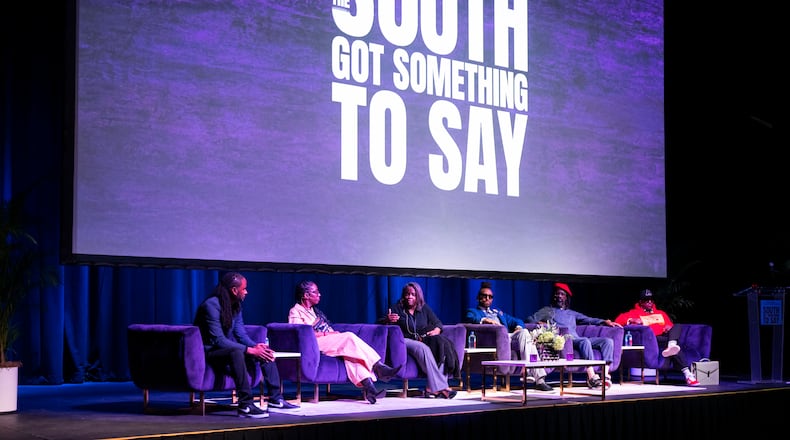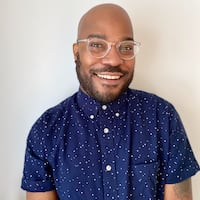Picture this: it’s Super Bowl LVIII, and the teams are about to take the field at Allegiant Stadium in Paradise, Nevada. Somewhere, Usher is going over last-minute details for his halftime performance.
Suddenly, instead of the expected anthem, the chorus to Fast Life Youngstaz’s “Swag Surfin’” blasts from the speakers. The crowd places their arms on each other’s shoulders swaying from side to side, a trio of kids from metro Atlanta uniting the people in attendance.
It’s not a crazy thought because, as EarthGang’s Doctur Dot sees it, dances and movements from Atlanta have passport books full of stamps.
Credit: Lauren Hubbard
Credit: Lauren Hubbard
The city has a reach that extends beyond the Perimeter because its hip-hop culture continues to drive the conversation globally, even though its early successes came long after the dominance of New York and Los Angeles.
To put a microscope on how the city and hip-hop grew together, the Atlanta Journal-Constitution’s first full-length feature film “The South Got Something to Say” features artists, executives, journalists, and others who explore that question of how we got here. During a series of live panels, interviews, and conversations in the hours leading up to the premiere of the documentary at Midtown’s Center Stage on Thursday, Nov. 2, it’s clear the South is still talking.
Understanding Atlanta’s rise in the past 30 years as a hub for Black creatives and the epicenter of rap music is no surprise to artist EarthGang emcee, Johnny Venus.
“Atlanta has always been a place where Black people have come to create their own opportunity,” Venus said in an interview with the AJC’s Najja Parker at Center Stage Thursday afternoon. “Ever since we were born, we look around, we see Black people in all types of positions in Atlanta.”
Credit: Lauren Hubbard
Credit: Lauren Hubbard
Those victories — Maynard Jackson becoming the first Black mayor of major Southern city in 1974, the 1996 Olympic Games, a thriving Black middle class — exist in the same space with inequality issues ahead of the 2026 World Cup. The realities of Atlanta — good and bad — are what is driving the conversation between the hip-hop luminaries with local ties.
Joceyln Wilson, whose work involves studying hip-hop as a cultural phenomenon worries that outside of Atlanta, the others are trying to mimic the South’s voice. “It has its own aesthetic; its own sound and people are applying it as a design approach that have nothing to do with the South,” she said.
Credit: Lauren Hubbard
Credit: Lauren Hubbard
In the past, whether it was the Dungeon Family collective coming together to celebrate their individual talents — blessing the world with OutKast, Goodie Mob and Organized Noize — or the rise of LaFace Records, the creative community ties were strong. When OutKast’s Andre 3000 issued his rallying cry, “the South got something to say,” that message grew beyond rap music.
“When Dre said that, it wasn’t just about the music thing in the South,” said longtime Atlanta photographer Shannon McCollum. “It was all of us.”
McCollum said that hip-hop in Atlanta thrives because people — artists, photographers, stylists, makeup artists, execs — work together to collectively raise its voice. Where the city needs to be careful going forward is continuing to build and support hip-hop in the South as a group effort where “we all have to tap in,” said Atlanta Influences Everything co-founder Bem Joiner.
Credit: Lauren Hubbard
Credit: Lauren Hubbard
Former LaFace Records executive Shanti Das said that Atlanta’s hip-hop future should involve holding its gatekeepers and labels around the country accountable for the missteps of the past, which includes a lack of women being represented.
“If you look where Nashville is and what it means to the world of country music; Atlanta should have had that same thing,” she said, lamenting that there is a lack of major label offices here. “With all of the hundreds of millions of dollars and iconic artists who came from the South having something to say, shame on the South and shame on us for missing the mark and making sure these labels maintained a presence here.”
Artist Deante’ Hitchcock said that despite his hometown’s shortcomings, “We’re still dominating the space.” That space — Atlanta and hip-hop — is undergoing a renaissance. Women artists are more prevalent, social media stars are born overnight, and the internet challenges the idea of regional sounds with audiences accessing other parts of the country from their phones.
Doctur Dot said he is not worried. If Atlanta and the South is trying to figure out what to say next, he feels like the generations will embrace what came before them; the history of Atlanta being overlooked, grabbing the world’s attention, and doing it unapologetically is what will always be at the core. That won’t change.
“We’re always going to have a place in the pantheon of human thought because we’re at the core of Black American culture,” he said. “We’re the nucleus.”
About the Author
Keep Reading
The Latest
Featured







